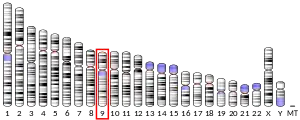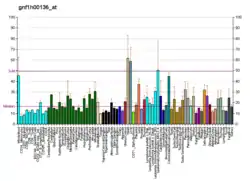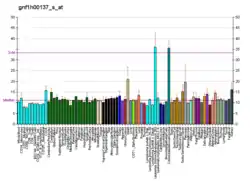PKN3 (gene)
PKN3 is a protein kinase C-related molecule and thought to be an effector mediating malignant cell growth downstream of activated phosphoinositide 3-kinase (PI3K).[5] It is thought that chronic activation of the phosphoinositide 3-kinase (PI3K)/PTEN signal transduction pathway contributes to metastatic cell growth and that PKN3 may mediate that growth.1
PKN3 is required for invasive prostate cell growth as assessed by 3D cell culture assays and in an orthotopic mouse tumor model by inducible expression of short hairpin RNA (shRNA). PKN3 may represent a target for therapeutic intervention in cancers that lack tumor suppressor PTEN function or depend on chronic activation of PI3K.
References
- GRCh38: Ensembl release 89: ENSG00000160447 - Ensembl, May 2017
- GRCm38: Ensembl release 89: ENSMUSG00000026785 - Ensembl, May 2017
- "Human PubMed Reference:". National Center for Biotechnology Information, U.S. National Library of Medicine.
- "Mouse PubMed Reference:". National Center for Biotechnology Information, U.S. National Library of Medicine.
- "Entrez Gene: PKN3 protein kinase N3".
- Shibata H, Oishi K, Yamagiwa A, Matsumoto M, Mukai H, Ono Y (July 2001). "PKNbeta interacts with the SH3 domains of Graf and a novel Graf related protein, Graf2, which are GTPase activating proteins for Rho family". Journal of Biochemistry. 130 (1): 23–31. doi:10.1093/oxfordjournals.jbchem.a002958. PMID 11432776.
Further reading
- Wissing J, Jänsch L, Nimtz M, Dieterich G, Hornberger R, Kéri G, Wehland J, Daub H (March 2007). "Proteomics analysis of protein kinases by target class-selective prefractionation and tandem mass spectrometry". Molecular & Cellular Proteomics. 6 (3): 537–47. doi:10.1074/mcp.T600062-MCP200. PMID 17192257.
- Leenders F, Möpert K, Schmiedeknecht A, Santel A, Czauderna F, Aleku M, Penschuck S, Dames S, Sternberger M, Röhl T, Wellmann A, Arnold W, Giese K, Kaufmann J, Klippel A (August 2004). "PKN3 is required for malignant prostate cell growth downstream of activated PI 3-kinase". The EMBO Journal. 23 (16): 3303–13. doi:10.1038/sj.emboj.7600345. PMC 514518. PMID 15282551.
- Shibata H, Oishi K, Yamagiwa A, Matsumoto M, Mukai H, Ono Y (July 2001). "PKNbeta interacts with the SH3 domains of Graf and a novel Graf related protein, Graf2, which are GTPase activating proteins for Rho family". Journal of Biochemistry. 130 (1): 23–31. doi:10.1093/oxfordjournals.jbchem.a002958. PMID 11432776.
- Oishi K, Takahashi M, Mukai H, Banno Y, Nakashima S, Kanaho Y, Nozawa Y, Ono Y (May 2001). "PKN regulates phospholipase D1 through direct interaction". The Journal of Biological Chemistry. 276 (21): 18096–101. doi:10.1074/jbc.M010646200. PMID 11259428.
- Oishi K, Mukai H, Shibata H, Takahashi M, Ona Y (August 1999). "Identification and characterization of PKNbeta, a novel isoform of protein kinase PKN: expression and arachidonic acid dependency are different from those of PKNalpha". Biochemical and Biophysical Research Communications. 261 (3): 808–14. doi:10.1006/bbrc.1999.1116. PMID 10441506.
This article is issued from Wikipedia. The text is licensed under Creative Commons - Attribution - Sharealike. Additional terms may apply for the media files.






